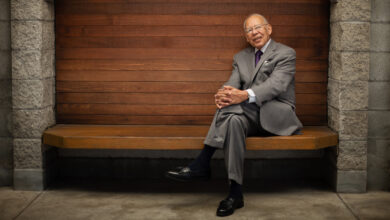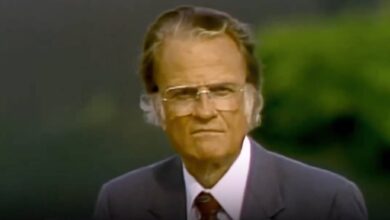How Old Is Too Old to Lead a Church?

In 2014, Christianity Today published a feature by Warren Bird, author of Next: Pastoral Succession That Works, about how 100 prominent US pastors successfully—and unsuccessfully—passed their role down to a new leader. Bird and co-author William Vanderbloemen found that half stepped down by age 65 and that the average age of American church leaders was 55.
This year, CT sought to explore the issue of pastoral succession from a different cultural perspective: churches in Asia. Hierarchy and respect for elders often make passing the baton more difficult for senior pastors in this region, and the aging population in some countries means more pastors are leading into their later years.
We asked six pastors in East and Southeast Asia—in China, Japan, Singapore, Indonesia, and the Philippines—for their views on whether churches or denominations should set age limits for senior pastors and how they can prepare for a smooth succession. Responses are arranged from yes to no:
Freddy Lay, 68, former lead pastor and former chairman of Indonesia Chinese Church (GKI) in Jakarta, Indonesia:
It would be wise for a church or denomination to set age limits for pastors, since we all have limited lifespans and our bodies and minds deteriorate due to age. I chose to retire at 65, although I kept serving the Lord after my retirement in an advisory role, which is a less physically demanding task. Retired ministers can get involved in mentoring other leaders. [Lay successfully added a pastoral age limit of 65 into his denomination’s constitution.]
Although the Bible does not include specific age limits for a pastor, we can learn from the examples set in the Bible regarding succession. For example, God set a time limit for priests and Levites to serve in the temple (Num. 8:25–26).
We can also look at the leadership succession from Moses to Joshua and from Elijah to Elisha. A pastor must start preparing a succession plan as soon as they begin carrying out their leadership role. He does this by modeling what it means to lead the church and investing time in prayer for God’s will. Cultivating a new generation of leaders is one of the most important roles of current leaders.
Armando Canoy, 59, president of Philippine Baptist Theological Seminary in Baguio City, Philippines:
It is wise for churches to set age limits for senior pastors because in some cases, a church is filled with the senior pastor’s relatives, who want the pastor to stay until he dies of old age. Thus, I think 70 should be the retirement age at these kinds of churches.
At 70, I’ve seen some senior pastors who are still mentally sharp, full of wisdom, and great in their personal and social relationships. However, physical health is a great challenge. After 70, health issues often take over, especially for senior pastors who are not economically well-compensated by their churches. This also leads to financial struggles, as most senior pastors in the Philippines do not have medical insurance coverage or retirement savings. Some senior pastors want to stay in their position until old age so that they can secure financial provisions.
Of course, 70 as a retirement age is not in the Bible. For instance, Moses started his ministry at age 80. But in Numbers 8:25–26, the Levites were told to stop performing duties that require laborious lifting of equipment in the tabernacle at age 50. Physically, they may not be as effective in performing these duties. Yet they were asked to assist in the Tent of Meeting in carrying out other duties.
These verses prove that there is a need for senior pastors to transition when effectiveness diminishes. As to the age, 70 is considered old in the Philippines. Hence, it’s time for a new breed and generation of leaders. It’s Joshua’s time.
Zhang San (pseudonym), 47, pastor of a Baptist house church in China:
Writing a fixed age into the church’s constitution might not be a good idea. That’s because there may be times of hardship when you need a trustworthy and proven faithful servant to serve longer. Also, the health situation may differ from pastor to pastor. Finally, the relationship between a shepherd and his flock also varies: Sometimes the congregation loves and trusts their pastor so much that they want them to stay longer. Other times, people prefer to bring in fresh air.
At the same time, I can see the benefits of having an age limit. Some senior pastors hold on to authority and refuse to give opportunities to the younger generation. Also, older people are usually not willing to change their ideas—in Chinese, we have a common saying that “experienced masters can’t learn new skills”—and may be too stubborn to pivot when the situation requires it.
So it would be wise for a church to set an age for senior pastors and lay elders but to also set criteria for allowing exceptions. The Bible talks about both the value of experienced leaders (Ps. 92:14; Prov. 16:31, 20:29) and the danger of being stubborn or controlled by others in a person’s last years (Gen. 27:1, 1 Sam. 2:27–33, 1 Kings 1:1).
In Chinese culture, depriving an older person of authority because of his or her age is a humiliating and disrespectful act. Most founding pastors serve till their death. So my thoughts on this issue are very different from the majority viewpoint in Chinese house churches but align with other leaders of my generation (those born after the 1970s).
Preparing a new successor should start immediately in a pastor’s ministry, as anything could happen—especially in China, where a pastor could be detained at any time. Moving to a new senior pastor is very difficult when trust has been built between the pastor and the congregation. Also, the longer a pastor serves, the stronger the church culture and the harder it is for another person to fit into this culture.
Satoru Kanemoto, 75, former senior pastor of Nerima Church of God and former chairman of the Japan Lausanne Committee in Tokyo, Japan:
Churches should set age limits for senior pastors so that there are fewer power struggles during leadership transitions. Yet pastors should also have the option to continue if the church agrees to it.
As to the age at which that limit should be placed, it depends on the pastor. He or she should be able to extend or shorten it depending on his or her health or mental condition. When I first took pastoral leadership at Nerima Church of God in 1988, the cultural norm was for people to retire at 60. Nowadays, the age has risen to 65, and soon it will be 70. The age limits on pastors should also be flexible based on the needs of the church.
In Romans 12:1–21, we see that God allows us to be faithful to his call. I believe the Prince of Peace gives us opportunities to serve the Lord in different roles after pastoral leadership. In my case, I retired at 70 and then became the headmaster of a nursery school and also the president of Japan Missiological Society.
While some denominations have age limits for senior pastors, the shortage of pastors in Japan makes it difficult to maintain. Many churches ask retiring pastors to stay until the church can find a new pastor. If the pastor still decides to retire, then the denominational leaders ask other retired pastors to come in and preach, or lay leaders preach in turn. Occasionally, pastors’ wives help preach in the church.
I started preparing to hand over the pastoral role when I became a pastor at 33. I strongly recommend young pastors to start thinking about it early and consider what would be best for the church they are leading. Some of the challenges in succession I’ve seen include power struggles for the pastor’s financial resources, the church members’ attachment to the pastor, and vice versa. Sometimes these cause churches to divide.
Lora Timenia, 36, faculty at Asia Pacific Theological Seminary in Baguio, Philippines:
It is not wise to set age limits for pastors. The call of God is designed by God and should not be limited by age, gender, race, or social status. Moreover, the anointing of God for a position, role, or office determines who serves and how long one serves. King Josiah was very young when he was appointed king. Caleb was quite old when he entered the Promised Land. Hence, there is no set age for the calling of God.
Personally, I prefer to retire and be a hobbyist at 70. Our bodies grow weaker through the years. The things we could do before can become tougher to do as our bodies age. Our memories, our speaking voice, our capacity to stay up late, or our social pacing may not be the same as when we were younger. Plus, generations evolve fast. The things that my generation liked may be eons away from what the current generation likes.
That being said, in the pastoral office, age is actually an asset. The wisdom learned through the years and solid relationships developed with God and with congregants through time is a treasure for the church. So if God does not guide a pastor out of office, then he or she should stay put regardless of his or her age.
The majority of the pastors in the Philippines hold on to the pastoral office until there is very explicit guidance from God to step down. However, many pastors are not prepared to be succeeded by younger generations. Because they do not have retirement plans, they have no other source of income but the church salary and no other place to dwell but the parsonage. There are instances when the calling has passed but the pastor does not want to leave due to living necessities.
I have always believed that discipleship is the priority ministry of every pastor. Discipleship means raising genuine followers of Jesus. Genuine followers of Jesus ultimately end up serving in various ministries, including pastoral leadership. I will never forget what a Singaporean pastor said to me: “Let my ceiling be your floor.” Pastors should normalize the building up of others, whether it is for succession or not.
Soo-Inn Tan, 68, director of Graceworks, a Christian publishing and training ministry in Singapore:
We first need to ask, What is a church? If a church is primarily a family, it would be strange to set a retirement age for the senior parent figure. If we see the church as primarily an organization, then there is merit in setting up a retirement age to ensure there is a succession plan.
The Bible does not speak of a retirement age for senior pastors. I suspect the issue of age limits for senior pastors arises because there are leaders who overstay their welcome, leading to dysfunction in their church. This is a problem that needs to be addressed.
Therefore, the question is not so much about setting limits but considering how we can ensure that the right people continue to serve as pastors and how to help those no longer suitable for leadership roles to step away.
We also need to provide pathways for those who should no longer serve as senior pastors to serve in other ways, like mentoring, writing, prayer, teaching, or pastoral care. We never want to give the impression that just because a person is no longer a senior pastor, he or she is no longer of use to the kingdom.
Singapore is a rapidly aging society. With better health care and diet, many will be fit and functional late into life. Numbers like 65 or 70 will be of no help in helping us understand the capability of a person. People age differently. My mother died at 94, having struggled with dementia and Parkinson’s for about eight years before her passing. My lecturer at Regent College, James Houston, is 101 and still writing. Age alone is not useful to gauge a person’s suitability for service.
God decides when we come and go, so at all times, pastors should seek to lead the church in a way that conveys that the church and its mission is bigger than any one person.
Additional reporting by Isabel Ong




